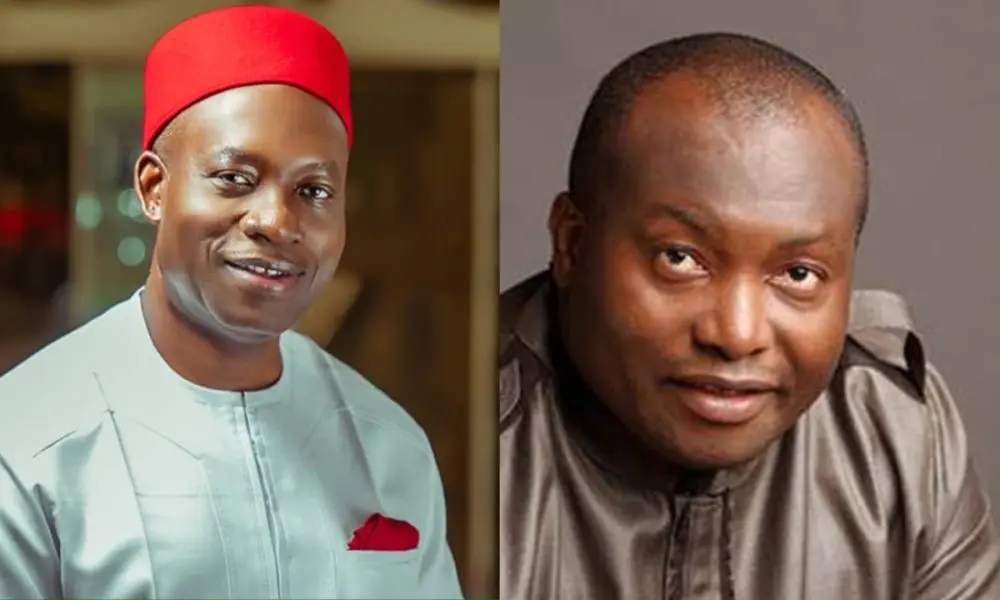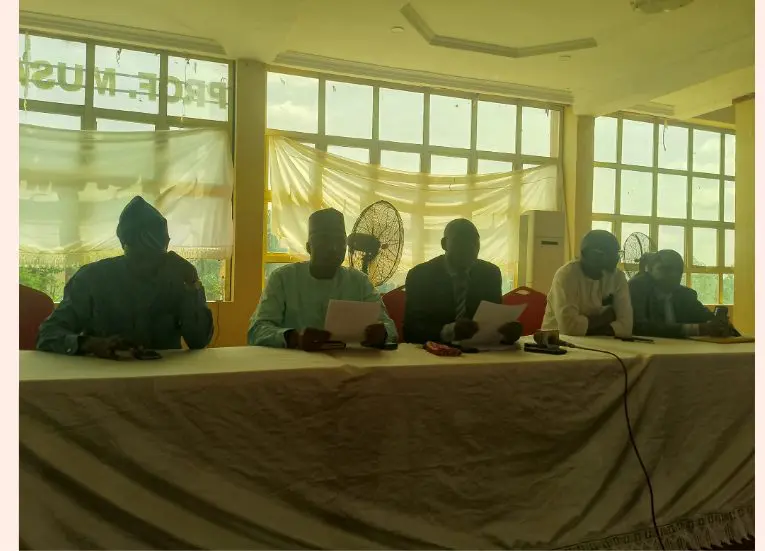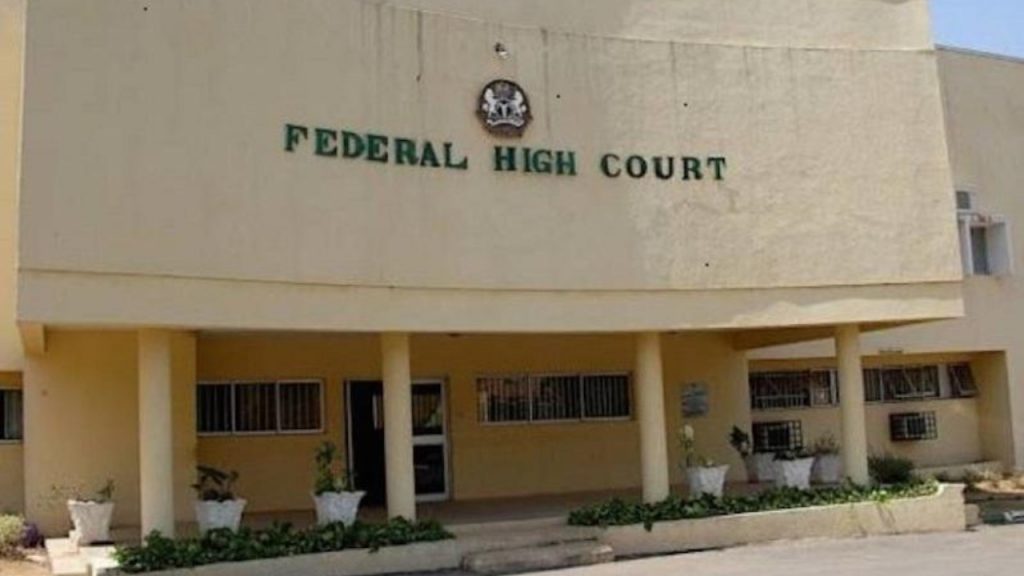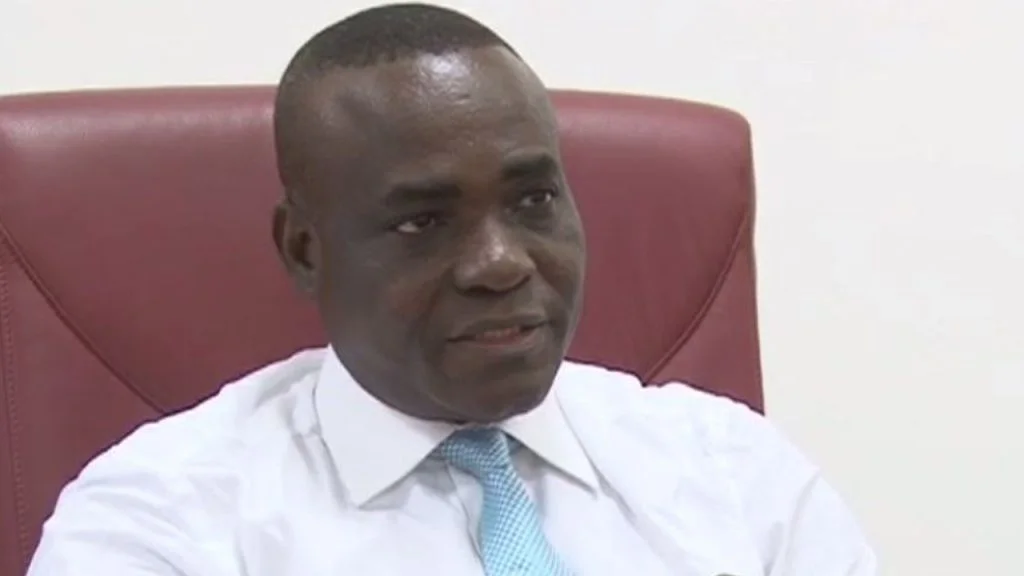News
Anambra 2025: Soludo, Ubah begin early rivalry, fight over chieftaincy title

Indications suggest that the competition for the 2025 gubernatorial race in Anambra State may have commenced. This follows recent tensions between the Anambra State government and Senator Ifeanyi Ubah, the representative of Anambra South senatorial zone. Ubah, who switched from the Young Progressives Party (YPP) to the All Progressives Congress (APC) in October 2023, is speculated to be the chosen APC candidate for the upcoming election.
Rumors circulated that Ubah and Senator Uche Ekwunife formed an alliance to run as governor and deputy governor candidates, respectively, under the APC banner. This move raised concerns among other political parties, particularly the ruling party, APGA.
The recent conferment of a chieftaincy title on Ubah during the festive season has sparked a crisis. Ubah received the title of Odenjinji of Neni, the same title held by Governor Soludo from his Isuofia community. Apparently displeased with Ubah’s growing influence, the Anambra State government suspended the monarch, accusing him of not obtaining clearance before awarding titles, especially to individuals with questionable character.
The suspension led to debates over the governor’s motives, with some viewing it as a politically motivated move to diminish Senator Ubah’s influence. The APC, in response, called for the reinstatement of the suspended monarch, emphasizing the potential negative impact on the state’s peace and development.
The development has also sparked discussions about the governor’s directive, with some believing it to be a politically motivated action aimed at reducing Senator Ubah’s influence. In response to the situation, Senator Ubah dismissed the suspension as political maneuvering by Governor Soludo, suggesting that Soludo is frustrated by his rising political profile.
Reports indicate that eight other traditional rulers who conferred titles during the same period may face suspension, with some already seeking forgiveness from the governor to preserve their positions.
News
Nigeria s 1999 Constitution full of flaws – Muslim lawyers association

The Muslim Lawyers Association of Nigeria, MULAN, has declared that there are many defects and flaws in the current 1999 Constitution of the Federal Republic of Nigeria.
MULAN National President, Dr Kazeem Olajide Olaniyan, made this declaration while addressing a press conference to herald the 15th annual general conference of the association on Thursday in Ibadan, the Oyo State capital.
Olaniyan stressed that Nigeria needs a homegrown Constitution that will address the current challenges facing the country.

According to him, the 1999 Constitution was drafted during the military rule and has many defects and flaws.
He noted that a homegrown will address the current problems the country is facing.
Olaniyan while speaking further, maintained that the theme of the conference, ‘National Development: The new dynamics and nuances’, was chosen so as to provide solutions to the country’s problems.
He also used the medium to appeal to the government to address the issue of fuel scarcity, food crisis and inflation in the country.
“Any Constitution Nigeria must have must be homegrown. What we have now was drafted by the military.
“There are so many defects and flaws in the 1999 constitution.
“Removal of subsidy of petroleum has effect on all of us coupled with inflation. We are now experiencing fuel scarcity.
“As we speak, if we are blaming the government, there are so many things we as people are also causing. We are also calling on the government to address the problem of food insecurity.”
News
Court adjourns trial in Nigerian Govt versus Ali Bello, others to May 27

Senator Ita Enang, former Special Adviser to the President on National Assembly Matters, attributed the failure of the Nigerian economy, the escalating debt burden, and the depreciation of the national currency, the naira, to the National Assembly. Enang made these remarks during the public unveiling of Oversight Magazine, a publication dedicated to covering parliamentary events, by former House of Representatives member Aniekan Umannah.
Enang asserted that the National Assembly’s inability to pose pertinent inquiries was accountable for the economic challenges. Having chaired both the House and Senate Committees on Rules and Business, Enang criticized the chambers for never releasing reports on their oversight duties as required, nor for questioning the nation’s debt.
He highlighted that while lawmakers frequently conduct oversight visits to scrutinize the activities of Ministries, Departments, and Agencies, they neglect to present their findings for deliberation on the parliamentary floor. According to him, the executive’s suboptimal performance, at both state and national levels, can be attributed to the deficient oversight of the National Assembly and state Houses of Assembly nationwide.
Enang emphasized the importance of the oversight function, stating that it allows for monitoring the utilization of budget allocations, assessing project progress, and planning future budgets accordingly. He concluded that the failure of the Nigerian economy, the devaluation of the naira, and the excessive debt accumulation are ultimately the responsibility of the National Assembly.
News
NASS responsible for failure of Nigeria’s economy, rising debt – Ita Enang

Senator Ita Enang, former Special Adviser to the President on National Assembly Matters, attributed the failure of the Nigerian economy, the escalating debt burden, and the depreciation of the national currency, the naira, to the National Assembly. Enang made these remarks during the public unveiling of Oversight Magazine, a publication dedicated to covering parliamentary events, by former House of Representatives member Aniekan Umannah.
Enang asserted that the National Assembly’s inability to pose pertinent inquiries was accountable for the economic challenges. Having chaired both the House and Senate Committees on Rules and Business, Enang criticized the chambers for never releasing reports on their oversight duties as required, nor for questioning the nation’s debt.
He highlighted that while lawmakers frequently conduct oversight visits to scrutinize the activities of Ministries, Departments, and Agencies, they neglect to present their findings for deliberation on the parliamentary floor. According to him, the executive’s suboptimal performance, at both state and national levels, can be attributed to the deficient oversight of the National Assembly and state Houses of Assembly nationwide.
Enang emphasized the importance of the oversight function, stating that it allows for monitoring the utilization of budget allocations, assessing project progress, and planning future budgets accordingly. He concluded that the failure of the Nigerian economy, the devaluation of the naira, and the excessive debt accumulation are ultimately the responsibility of the National Assembly.
-

 World News7 months ago
World News7 months agoWhat we know about Israel’s war with Hamas
-

 Sports7 months ago
Sports7 months agoLaLiga: Everyone want to play with him – Vinicius on player Real Madrid should sign
-

 World News7 months ago
World News7 months agoIran calls on Islamic, Arab countries to confront Israel
-

 Tech7 months ago
Tech7 months agoTop 10 AI Skills to Learn in 2023
-

 Entertainment7 months ago
Entertainment7 months agoBET Hip-Hop Awards: Black Sherif wins big as Burna Boy loses seven nominations
-

 Entertainment7 months ago
Entertainment7 months ago‘Black Panther’ star Lupita Nyong’o breaks up with boyfriend, Selema Masekela
-

 ICT8 months ago
ICT8 months agoApple Bows To EU, Unveils iPhone With USB-C Charger
-

 World News7 months ago
World News7 months agoZelensky seeks defences for winter on visit to NATO






